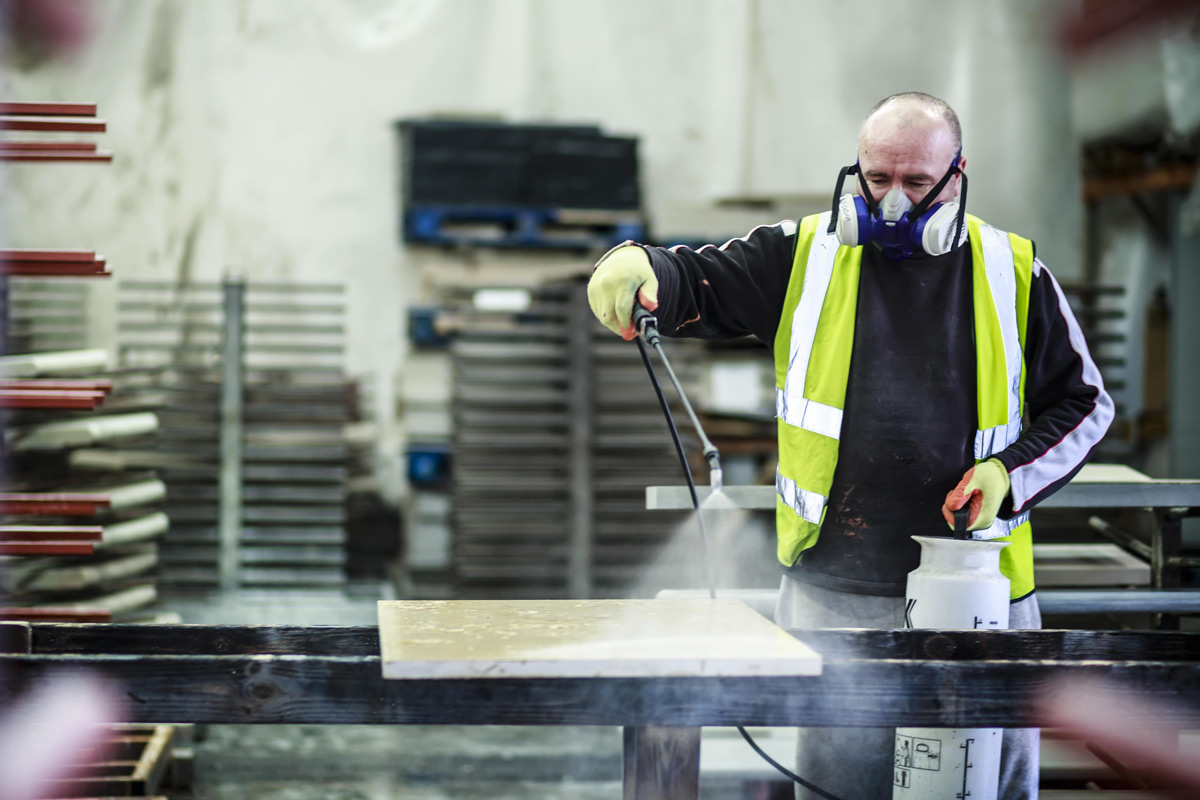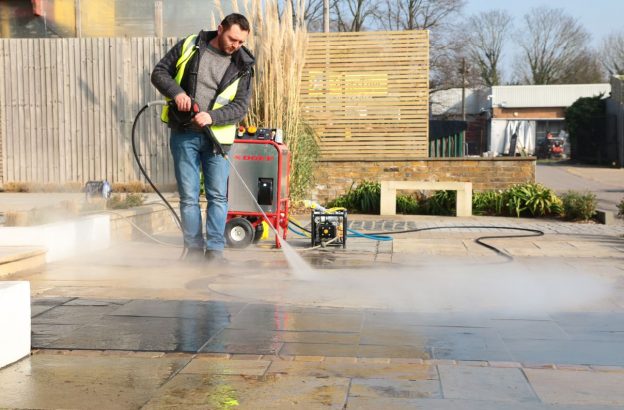One of the most common questions posed by our customers is 'Do porcelain tiles need sealing?" It’s an important query, particularly if you’re installing your porcelain paving yourself. We tell you what you need to know about sealing outdoor porcelain tiles.
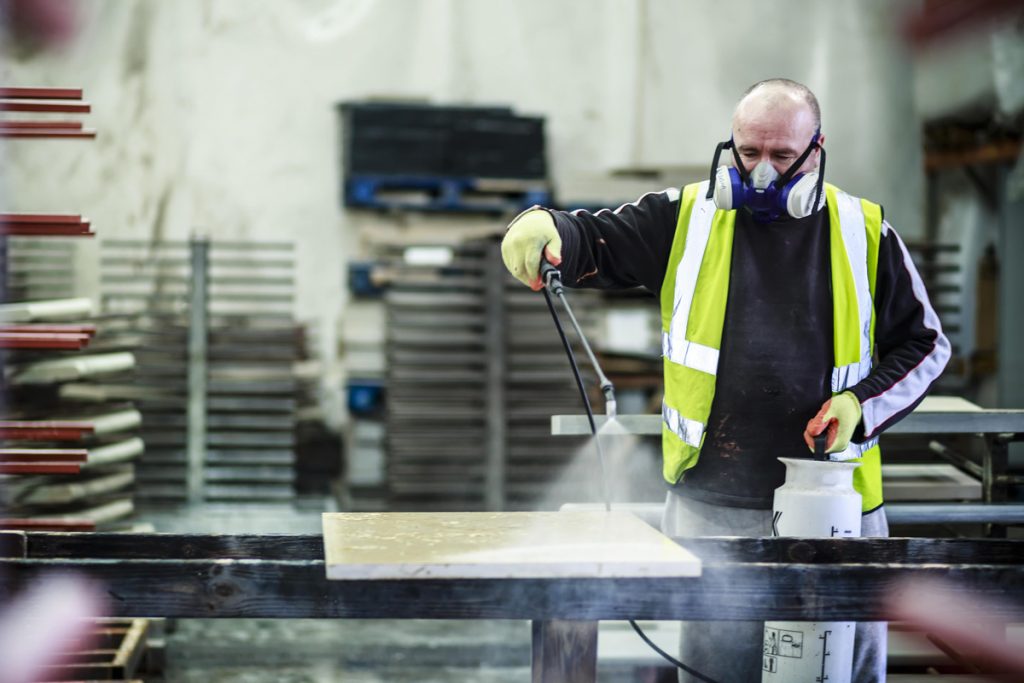
With over 15 years' experience in the landscaping industry, we've gained a great deal of expertise in porcelain installation, so we know a thing or two about sealing paving slabs.
If you still have questions after reading through this page, please contact our friendly team and we’ll help you as much as we can.
Do porcelain paving slabs need to be sealed?
Before installing a new porcelain paver in your outdoor space, it's important to get as much information about the process as you can - particularly if you'll be carrying out the work yourself. Alternatively, you can search for a dedicated landscaper or garden designer in your local area using our handy search tool.
As porcelain is a durable and hard-wearing material, it doesn't need to be sealed. Regardless of whether you opt for our Project or Luxury range, our porcelain paving has a low porosity, which means that natural nuisances such as algae and moss are less able to gain a foothold in the pores of the material. Therefore, you do not need to seal porcelain if you don't want to.
However, light-coloured paving that receives a high level of footfall or vehicular traffic (e.g. when chosen as a paving for driveways or patios), or areas of porcelain paving situated under dense foliage, may require more cleaning. Our porcelain paving slabs are made from good quality materials, so they respond very well to either jet washing or to a scrub with a stiff brush and water. However, sealing porcelain (either during the installation process or by using our pre-sealing service for outdoor tiles) can make cleaning quicker and easier, so it may be a worthwhile choice for you.
What type of sealant should I use for my porcelain patio?
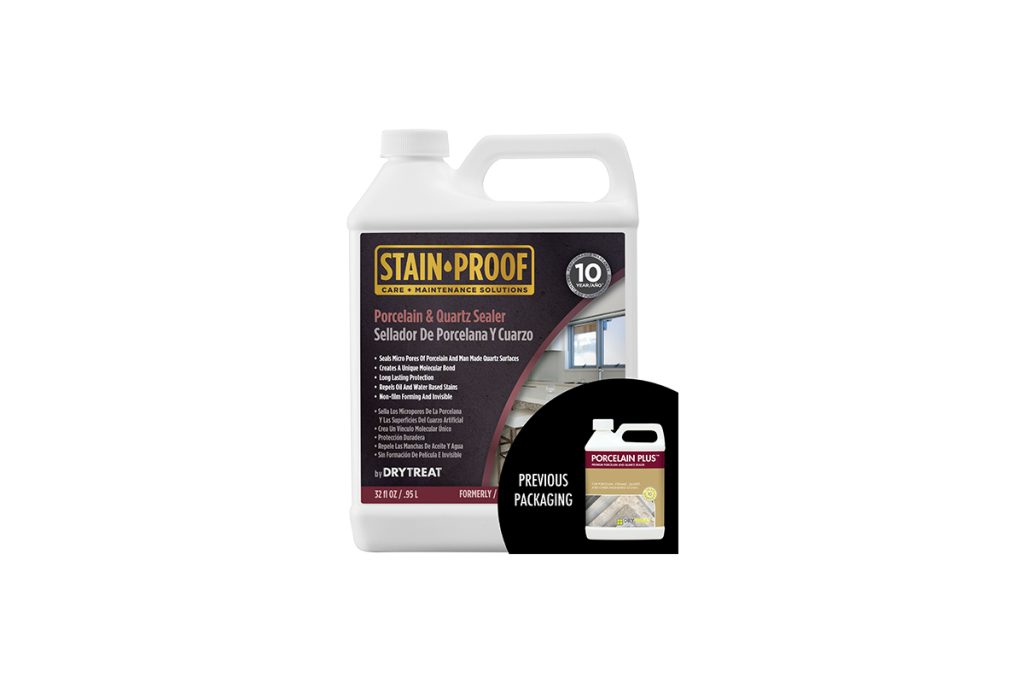
If you've decided you'd like to seal your porcelain paving, we recommend using an impregnating sealant that is specific to porcelain. This is because it has been specially created to work with the dense material. Dry Treat Premium Porcelain and Quartz sealer contains minuscule molecules that seal micropores in the surface of the porcelain, without leaving a film on the surface. Find out more about the best type of porcelain sealant to use.
Topical sealant - a coating that sits on the surface of stone or porcelain slabs - is another option. We don't recommend this for a number of reasons, including that it can change the colour of your paving and also reduce its slip-resistance when wet. It also needs regular application and can wear unevenly under heavy foot traffic. For more information on the different sealers and what we recommend, read our guide to sealing stone and porcelain paving.
If you have decided to seal your porcelain paving yourself, we include useful information in our DIY guide to sealing paving slabs.
Should I have my porcelain tiles pre-sealed?
If you want to seal porcelain, another option is to have your porcelain patio slabs pre-sealed. Pre-sealing is when the porcelain is sealed before delivery, taking the hassle out of your hands during the installation process.
If you would like to pre-seal your tiles, we offer a dedicated in-house pre-sealing service for our customers. With prices available from £15.76 + VAT m² (£18.91 inc VAT), our pre-sealing solution uses Dry Treat's Stain Proof Porcelain and Quartz impregnating sealant. This product contains permanent bonding nanotechnology that penetrates your porcelain slabs, offering long-lasting protection against the elements and stains. Having your porcelain paving sealed by an approved operative, like London Stone, gives you a 10-year guarantee.
Stain Proof is suitable for both indoor and outdoor projects - if you would like to have your porcelain tiles pre-sealed before delivery, please get in touch with our helpful team.
How do I maintain my outdoor porcelain tiles?
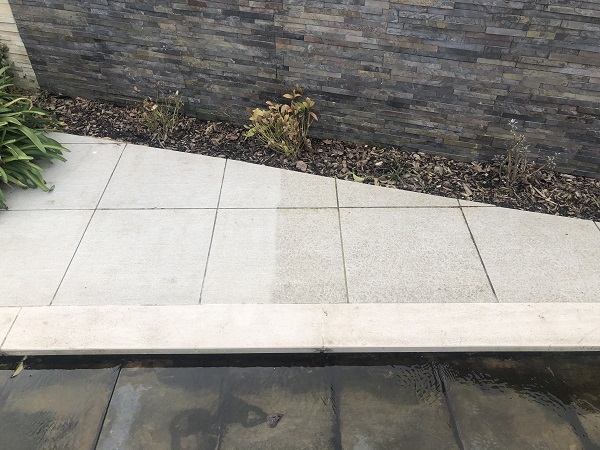
Porcelain is a straightforward material to maintain, giving an advantage to using it over other forms of paving.
Regardless of whether your tiles have been sealed or not, it's recommended that you clean your tiles at least twice a year, in autumn after summer usage, and in spring, to clean up after winter. It's also always a good idea to attend immediately to any spills and stains.
A jet wash or stiff brush can be used and, with general dirt, a porcelain patio will come up like new when cleaned properly. It's important to use a jet wash correctly to avoid damage to tiles and grout. For a comprehensive look at how to deal with different types of stain, please see our guide to cleaning outdoor porcelain tiles.
Browse our collection of porcelain paving products
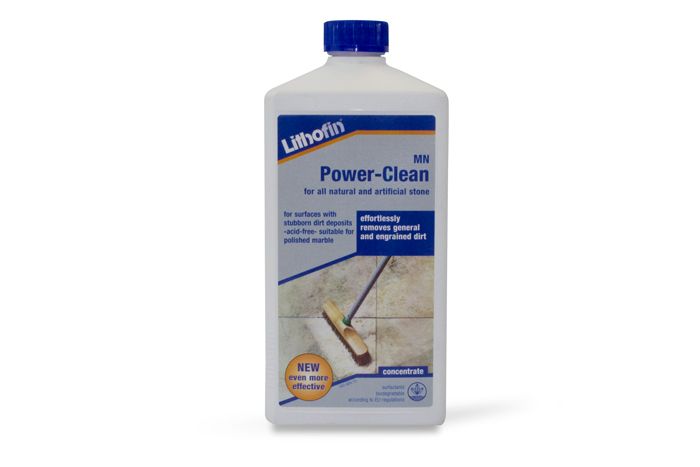
At London Stone, we aim to provide all our customers with the tools needed to install porcelain paving slabs, and to take care of them long after installation. That's why we sell more than just paving, with a selection of patio-laying materials available to purchase through our store, including sealant, patio grout and patio cleaner.
All our items can be easily purchased through our website - just add your desired products to your shopping cart and go through the easy instructions online. For more information on the installation process, please head to our dedicated blog page on laying your porcelain slabs.
Alternatively, if you'd like to speak to a team member about your pre-sealing options, please contact us.


/filters:quality(40)/mediadev/media/homepage/price_right_arrow.svg)
/filters:quality(60)/mediadev/media/menu-pics/menu_banner_mobile.png )
/filters:quality(60)/mediadev/media/menu-pics/all-porcelain.jpg )
/filters:quality(60)/mediadev/media/menu-pics/luxury-italian.jpg )
/filters:quality(60)/mediadev/media/menu-pics/premium-italian.jpg )
/filters:quality(60)/mediadev/media/menu-pics/budget-porcelain.jpg )
/filters:quality(60)/mediadev/media/menu-pics/large-format-porcelain.jpg )
/filters:quality(60)/mediadev/media/menu-pics/wood-effect-porcelain.jpg )
/filters:quality(60)/mediadev/media/menu-pics/porcelain-planks.jpg )
/filters:quality(60)/mediadev/media/menu-pics/porcelain-setts.jpg )
/filters:quality(60)/mediadev/media/menu-pics/browse-all-paving.jpg )
/filters:quality(60)/mediadev/media/menu-pics/stone-paving.jpg )
/filters:quality(60)/mediadev/media/menu-pics/interior-tiles.jpg )
/filters:quality(60)/mediadev/media/menu-pics/stone-effect-porcelain.png )
/filters:quality(60)/mediadev/media/menu-pics/wood-effect-porcelain.png )
/filters:quality(60)/mediadev/media/menu-pics/grey-porcelain.png )
/filters:quality(60)/mediadev/media/menu-pics/beige-porcelain.png )
/filters:quality(60)/mediadev/media/menu-pics/dark-porcelain.png )
/filters:quality(60)/mediadev/media/menu-pics/light-porcelain.png )
/filters:quality(60)/mediadev/media/menu-pics/patio-grout.jpg)
/filters:quality(60)/mediadev/media/menu-pics/primers.jpg)
/filters:quality(60)/mediadev/media/menu-pics/porcelain-blades.jpg)
/filters:quality(90)/mediadev/media/menu-pics/drainage.jpg)
/filters:quality(60)/mediadev/media/menu-pics/cleaners.jpg)
/filters:quality(60)/mediadev/media/menu-pics/all-stone-paving.jpg )
/filters:quality(60)/mediadev/media/menu-pics/all-sawn-paving.jpg )
/filters:quality(60)/mediadev/media/menu-pics/all-riven-paving.jpg )
/filters:quality(60)/mediadev/media/menu-pics/indian-sandstone.jpg )
/filters:quality(60)/mediadev/media/menu-pics/limestone-paving.jpg )
/filters:quality(60)/mediadev/media/menu-pics/granite-paving.jpg )
/filters:quality(60)/mediadev/media/menu-pics/slate-paving.jpg )
/filters:quality(60)/mediadev/media/menu-pics/yorkstone-paving.jpg )
/filters:quality(60)/mediadev/media/menu-pics/stone-pavers.jpg )
/filters:quality(60)/mediadev/media/menu-pics/cobbles-setts.jpg )
/filters:quality(60)/mediadev/media/menu-pics/plank-paving.jpg )
/filters:quality(60)/mediadev/media/menu-pics/paving-circles.jpg )
/filters:quality(60)/mediadev/media/menu-pics/bespoke-paving-1.jpg )
/filters:quality(60)/mediadev/media/menu-pics/edging-stones-1.jpg )
/filters:quality(60)/mediadev/media/menu-pics/prestige-stone.jpg )
/filters:quality(60)/mediadev/media/menu-pics/grey-blue-stone.png)
/filters:quality(60)/mediadev/media/menu-pics/swatch-black-dark.jpg )
/filters:quality(60)/mediadev/media/menu-pics/swatch-buff-beige-white.jpg )
/filters:quality(60)/mediadev/media/menu-pics/sealants.jpg)
/filters:quality(60)/mediadev/media/menu-pics/all-clay-paving.jpg )
/filters:quality(60)/mediadev/media/menu-pics/alpha-clay-pavers.jpg )
/filters:quality(60)/mediadev/media/menu-pics/cottage-garden-clay-pavers.jpg )
/filters:quality(60)/mediadev/media/menu-pics/kessel-garden-clay-pavers.jpg )
/filters:quality(60)/mediadev/media/menu-pics/artisan-clay-pavers.jpg )
/filters:quality(60)/mediadev/media/menu-pics/grey-blue-clay-paver.png )
/filters:quality(60)/mediadev/media/menu-pics/red-brown-clay-pavers.png )
/filters:quality(60)/mediadev/media/menu-pics/beige-buff-clay-pavers.png )
/filters:quality(60)/mediadev/media/menu-pics/composite-decking.jpg )
/filters:quality(60)/mediadev/media/menu-pics/designboard-decking.jpg )
/filters:quality(60)/mediadev/media/menu-pics/classic-designboard.jpg )
/filters:quality(60)/mediadev/media/menu-pics/brushed-designboard.jpg )
/filters:quality(60)/mediadev/media/menu-pics/grooved-designboard.jpg )
/filters:quality(60)/mediadev/media/menu-pics/millboard-decking.jpg )
/filters:quality(60)/mediadev/media/menu-pics/grey-decking.jpg )
/filters:quality(60)/mediadev/media/menu-pics/black-charcoal-decking.jpg)
/filters:quality(60)/mediadev/media/menu-pics/brown-decking.jpg)
/filters:quality(60)/mediadev/media/menu-pics/all-build-deck.png )
/filters:quality(60)/mediadev/media/menu-pics/stone-cladding.jpg )
/filters:quality(60)/mediadev/media/menu-pics/all-garden-walling-1.jpg )
/filters:quality(60)/mediadev/media/menu-pics/facing-bricks.jpg )
/filters:quality(60)/mediadev/media/menu-pics/garden-screening.jpg )
/filters:quality(60)/mediadev/media/menu-pics/menu_Garden_banner_desk.png )
/filters:quality(60)/mediadev/media/menu-pics/all-steps-coping.jpg )
/filters:quality(60)/mediadev/media/menu-pics/stone-garden-steps.jpg )
/filters:quality(60)/mediadev/media/menu-pics/sawn-steps.jpg )
/filters:quality(60)/mediadev/media/menu-pics/riven-steps.jpg )
/filters:quality(60)/mediadev/media/menu-pics/yorkstone-steps.jpg )
/filters:quality(60)/mediadev/media/menu-pics/bespoke-steps.jpg )
/filters:quality(60)/mediadev/media/menu-pics/porcelain-steps.jpg )
/filters:quality(60)/mediadev/media/menu-pics/off-the-shelf.jpg )
/filters:quality(60)/mediadev/media/menu-pics/stone-coping.jpg )
/filters:quality(60)/mediadev/media/menu-pics/sawn-coping.jpg )
/filters:quality(60)/mediadev/media/menu-pics/riven-coping.jpg )
/filters:quality(60)/mediadev/media/menu-pics/yorkstone-coping.jpg )
/filters:quality(60)/mediadev/media/menu-pics/bespoke-coping.jpg )
/filters:quality(60)/mediadev/media/menu-pics/stone-pier-caps.jpg )
/filters:quality(60)/mediadev/media/menu-pics/porcelain-coping.jpg )
/filters:quality(60)/mediadev/media/menu-pics/all-bespoke-services.jpg )
/filters:quality(60)/mediadev/media/menu-pics/bespoke-paving-2.jpg )
/filters:quality(60)/mediadev/media/menu-pics/bespoke-steps-1.jpg )
/filters:quality(60)/mediadev/media/menu-pics/bespoke-coping-1.jpg )
/filters:quality(60)/mediadev/media/menu-pics/edge-profiles.jpg )
/filters:quality(60)/mediadev/media/menu-pics/masonry-services.jpg )
/filters:quality(60)/mediadev/media/menu-pics/deluxe-pergolas.jpg )
/filters:quality(60)/mediadev/media/menu-pics/proteus-pergolas.jpg )
/filters:quality(60)/mediadev/media/menu-pics/corten_planter_menu.png )
 Trade Discount Available
Trade Discount Available FREE Nationwide Delivery
FREE Nationwide Delivery Nationwide Showrooms
Nationwide Showrooms Live Stock Levels
Live Stock Levels Split Packs Available
Split Packs Available